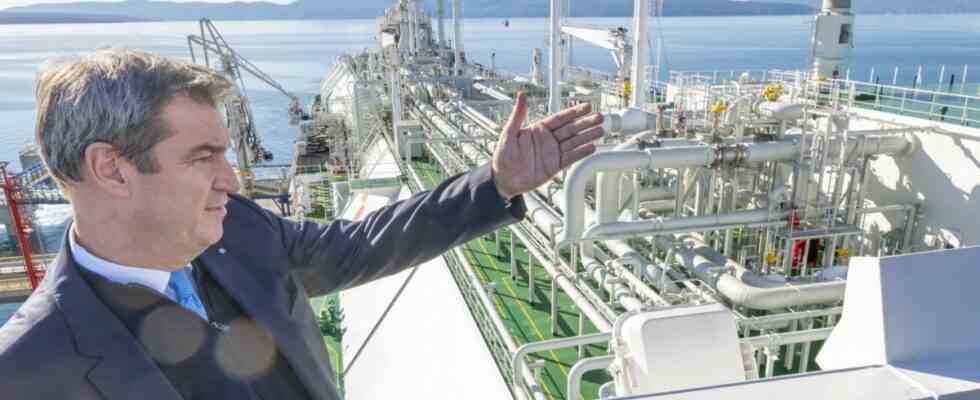He gets out of a black limousine, the Croatian Prime Minister stretches out his hand, Markus Söder grabs. That’s what he wanted, playing on an equal footing with the heads of state. That’s how he imagined it in 2021, when he wanted to become Chancellor. But now, at the end of 2022? The Bavarian prime minister shakes the hand of the Croatian prime minister – and speaks like someone who wants to tear the republic he would have loved to rule in half.
He wants to make Bavaria “not only more independent from Russia,” says Söder, but also “from the north” of Germany. For example with liquid gas from Croatia, that’s why he came here, in November, to the holiday island of Krk. The Russian war against Ukraine is hitting Bavaria hard, with around 90 percent of the natural gas consumed in Bavaria coming from Russia. That’s why Söder didn’t pray for war or the energy crisis.
Nevertheless, the crisis has given him a task. After two pandemic years, in which he grew to become chancellor and shrank again, the CSU boss was desperately looking for a profile for himself and his party. Now Söder has reinvented itself, just in time for the 2023 state elections. More than ever, the CSU sees itself as an independence movement, the party leader plays the southern sheriff, these are the new roles.
So the next metamorphosis took place at Markus Söder. And it looks like this quick-change artist’s latest performance could be a hit. With a hard-hearted refugee policy, Söder lost many votes in the 2018 state election (37.2 percent), as an eco-liberal he stumbled in the 2021 federal election (31.7) – in his now more conservative sheriff role he would, as of now, score. The last surveys of the year saw the CSU of the newly programmed Söder quite stable at around 40 percent – and the free voters constantly around ten. If there were already a state election this Sunday, everything would remain the same, black and orange Bavaria.
But it’s not yet the election, only on October 8, 2023. The opposition can therefore cling to one hope: that things will turn as quickly as they have in the past twelve months. In December 2021, the Greens, SPD and FDP could seriously dream of a traffic light in Bavaria, and a survey didn’t lack that much. And the circumstances gave rise to this dream: At that time, the investigative committee for the CSU mask affair, which the Bavarian traffic light parties had applied for together, began. The committee was worthwhile because it revealed structures in which politicians and business people shamelessly enriched themselves. But according to the polls, the traffic light parties were unable to distinguish themselves in the mask affair – and the damage to the CSU was limited.
The sound of the election campaign can already be heard
For the 2023 election year, the Greens, SPD and FDP have initiated two new sub-committees. On the explosion in costs for the second Munich S-Bahn tube and on the expensive lease for the Museum of the Future in Nuremberg. A signal for a traffic light alliance in the election campaign? SPD top candidate Florian von Brunn considers a Bavarian traffic light “capable of governing at any time”. The CSU, in turn, plans to exploit every traffic light coquetry in the election campaign. The red-yellow-green federal government offers “a permanent picture of the inner conflict, caused by the internal dispute,” the CSU boss has just emphasized again.
Söder rejects an alliance with the Greens, whom he ensnared for a long time. He is campaigning for a continuation of the black-orange coalition, which he is promoting as an alternative to the federal government. “We govern in Bavaria differently than traffic lights: with each other instead of against each other.” The sound of the election campaign, you can already hear it.
Söder once spoke of the “traffic light north” and of the “free south”. One can therefore expect that the CSU will interpret every election campaign appearance by a member of the Berlin government in Munich, Nuremberg or Regensburg as a coup d’état with which the traffic light spins its threads as far as Bavaria – in order to be able to control the Free State from outside if it wins the election. As long as the federal government is weak, the party agrees that this interpretation of the CSU can only be useful.
The party leader himself speaks of a “fateful choice” for Bavaria and the CSU. This applies even more to him as a person. Would the party forgive him another disappointment? He has proven often enough that Söder has mastered political role-playing. However, the CSU was not able to make substantial gains in any election under his leadership. Markus Söder has yet to find the role of the winner.

